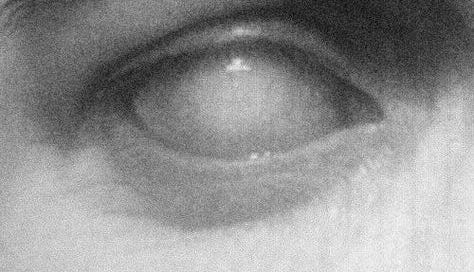: 🌕 : SPOILER ALERT : 🌕 :
I have had a special penchant for the morbid facets of life for as long as I can remember. The world of art has been my favourite place to hide in plain sight; the colours & codes, indentations of tune & phonetics; artistic mediums shine a dull dark light, brightly into the hollow eyes of the deceased.

With this in mind, I wanted to begin including tag content in this newsletter. Something about a format sings a tune sweetly to the eager organizational section of my mind. I could not think of a better place to start than with the Gothic Book Tag, originally created by The Classics Club. The questions intone much of the marvel I meet when paired with the very best gothic story & I hope that my answers might shed some light on the membrane that clicks & clacks the keyboard to produce these reviews.
Given my love of art, which you will have perchance come upon in my Short Story Reviews, I thought this to be the perfect time to sprinkle some wonderful pieces by an array of immense talent, along the way as I answer the following 13 questions, so that you may hopefully appreciate them as much as I have. Let’s begin.
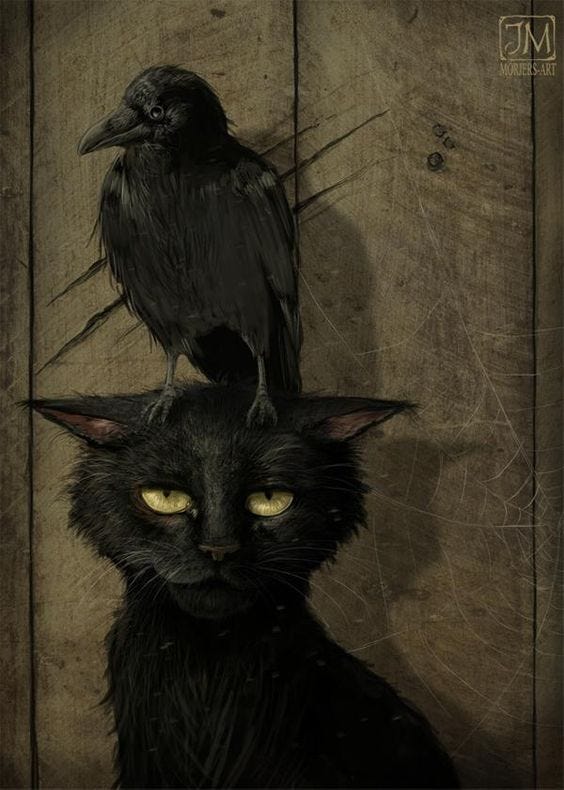
(1) WHICH CLASSIC BOOK HAS SCARED YOU THE MOST?
At the moment in which I am writing this, I find myself without an answer to this question. Certainly, I have read many stories that are meant to be terrifying. Arguably, the content of the majority of the books I consume contains objectively horrible & horrifying things, to varying extents. Yet, that is why I select them. I cannot, therefore, claim to be spooked by what I expect to find. This answer might come across as rather pretentious & that is certainly not my intent. Rather, I have simply not had the juicy opportunity to have a book scare me—at all—& therefore no more than any other. Here’s hoping the next calendar year brings me a shocking literary delight.
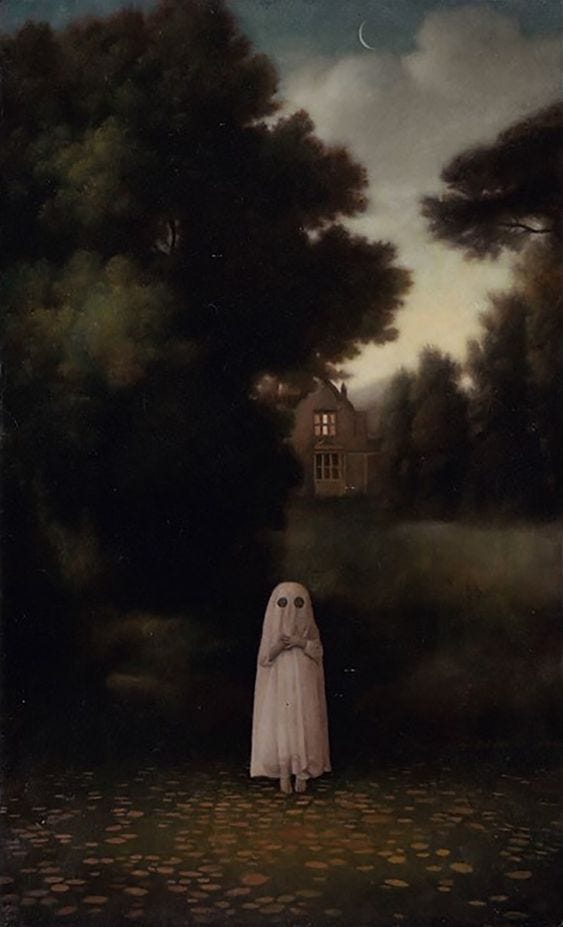
(2) WHAT IS THE SCARIEST MOMENT IN A BOOK?
There are a few ways to interpret this question. I suppose it is meant to mean, what is generally the maw which indicates that within the ensuing moments, darkness will be all-encompassing? To answer that, I will reference Ray Bradbury’s “Something Wicked This Way Comes” (1962).
The first time I read this book I found myself frustrated by the prose. Bradbury had selected a vernacular that would add dimension to the story whilst colouring the shades of every store shelf & tree leaf; everything was accounted for. I hadn’t an idea what to expect, though, I was anticipating something great thanks to its preceding reputation for being a Titan of Horror. Though I questioned whether or not this book was ultimately the best fit for me, my brain would not let me quit. I progressed slowly & with unease through the town, underground beneath the words & the spoken threats, until we came to the library.
On its own this scene was meant to peel back the reader’s intuition to breathe the truth of the world around them, one they were not expecting to find within this book. This scene is a perfect representation of what makes for the scariest moment in a book. While my feelings grew anxious hoping that Will and Jim could be kept hidden from Mr. Dark, the story’s tension came to a head; here I found that I had been wrong.
It is exceedingly difficult to write a good scary story, let alone repetitive scary scenes. The ability to leave one’s inhibitions to the side whilst a story is being told is a feat in & of itself. What scares me the most in books is the ability to engage my own mind—one that looks for logic & patterns—to lead me astray. Bradbury allowed me to roam the streets with the protagonists as a devilish circus settled just outside of their town. He encouraged me to feel the emotions that he brewed inside my heart; what was sure to happen would tear me apart. Yet, at the last second, he altered the course & the wind shifted; not a red herring or a misstep, though I was certainly too trusting of the author, he had something else in mind.
To make the scariest scene or the scariest book one needs to be patient. Objectively horrible things happen in the world every single day. For some readers, it is enough to read the combination of letters that reminds them that these events are present around them, for a fright to be felt. For me, I need more—more words, more lingering darkness, more to remove me from the tangibility of the solid mass in my hands; I need to forget that I’m reading. In so doing, the author shatters the safe space. When Mr. Dark roamed the world where Jim & Will played every summer & where the autumn moulded them to their favourite selves, Bradubry’s narrative hosted a place for me. When I left I found that the world of lost dreams, scary travelling groups of the unknown & the ghastly serpents of next door, were too real to escape. I appreciate him immensely for that.
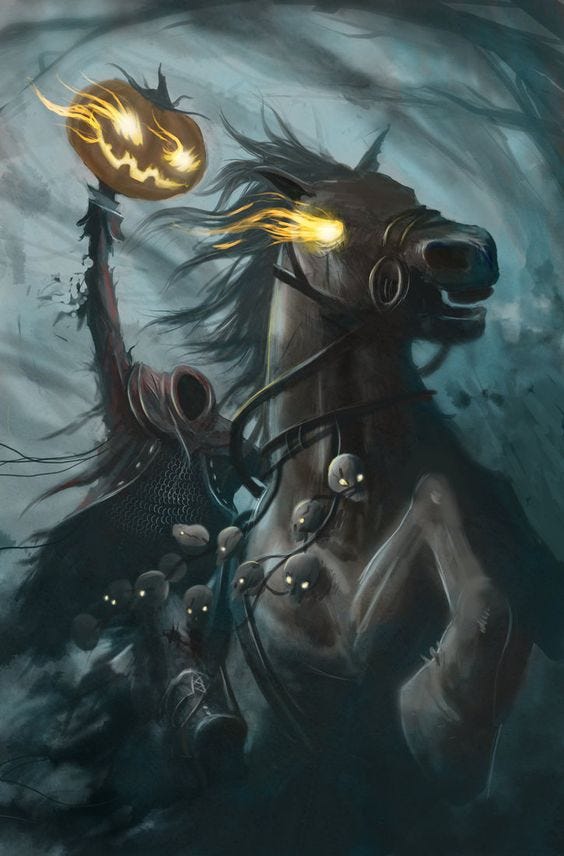
(3) WHICH CLASSIC VILLAIN DO YOU LOVE TO HATE?
This is a very interesting question & am once again presenting you with a less than simple answer. That is to say, I cannot think of any book that has a villain I am eager to hate. Over the course of many reading years, I found myself frustrated—supremely annoyed—& on occasion rather put out by characters but, this happens more often than not when they are blubbering eels rather than the intended antagonists. For example, the Governess in Henry James’ novella “The Turn of the Screw” (1898).
I find the practice of following a billowing ignoramus rather tedious. On occasion, stories have been all the way ruined for me due to the deliberate inabilities of their main characters. This was nearly the case in Sheridan Le Fanu’s “Uncle Silas” (1864). Poor Maud is simply & utterly helpless at every turn & goes so far as to romanticize the man who is intent on killing her for her inheritance.
Do not get me wrong, I appreciate the time period that accompanies many of the stories that see female main characters depicted as helpless oafs. However, it’s still so dreary to read chapters on end with a rotation of whiplash—tears & pity, tears & garden walks, tears & the very obvious brought to the forefront. I would very much appreciate it if intelligent questions might be posed by these protagonists from time to time.
With that being said, I found many of the dual antagonistic protagonists of Victor Hugo’s « Notre Dame de Paris » (1831) rather catastrophic in nature & though this book does not necessarily fit into the genre of this tag, I am including it for the simple reason that I was eager to see them fall into the river & disappear into the church tower walls. Subsequently, this is also how I felt about every single character in Richard Matheson’s “Hell House” (1971). This final example was so shockingly dense in imbecility that I was rather excited at the prospect that the sociopathic poltergeist might entrap them all in a tomb of their very own.
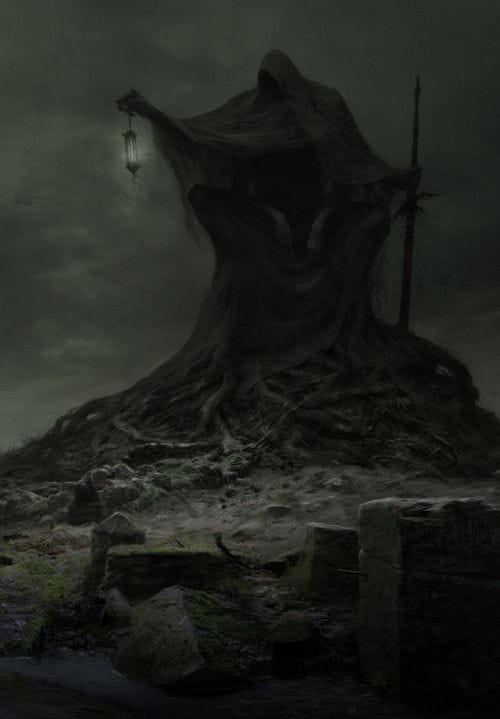
(4) WHAT IS THE CREEPIEST SETTING IN A BOOK?
As you will have intoned by my previous answers, I have a particularly fond appreciation for stories that are set in our own world. This is not to say that I need reminding of what is to be found in the realm in which I live. Rather, the tremendous ache that accompanies the inescapable truth of this setting is so juicy; it satiates a fruitful need in me to find stories that explore our society in whichever ways they so choose, be it fantastical Horror or with twinges of Magical Realism—I love them all.
In a more traditional sense, I find that haunted houses are the center point for many magnificently creepy events. Certainly, these stories have been explored before. Shirley Jackson’s “The Haunting of Hill House” (1959) set the scene for a story to take place inside a typically haunted house. Regardless of how many times I have read the plot before, I find myself eager to see if a modern work will come close to shadowing the reader into the darkened hallways of a house riddled with ghouls.
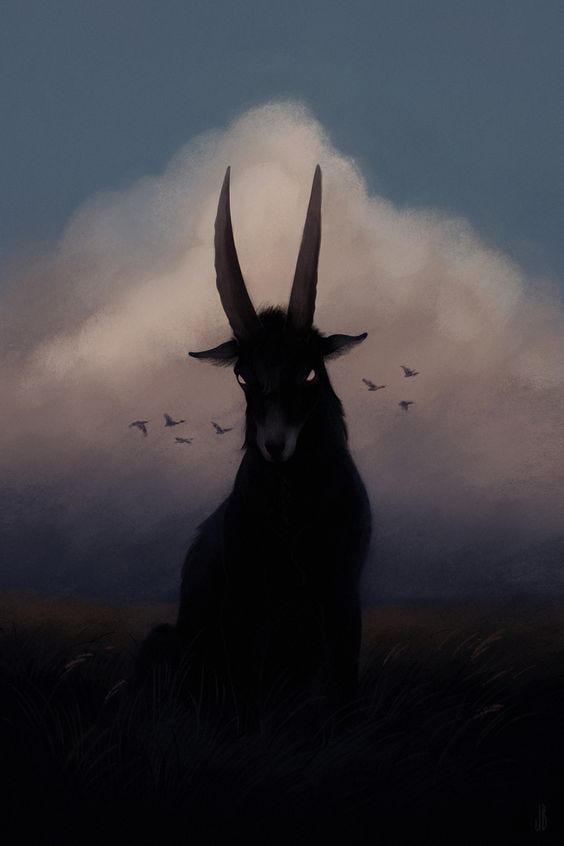
(5) WHAT IS THE BEST SCARY COVER?
I have, perhaps, not had the privilege of finding myself holding tightly to the ghastly act of a perfectly gothic story. To be determined…
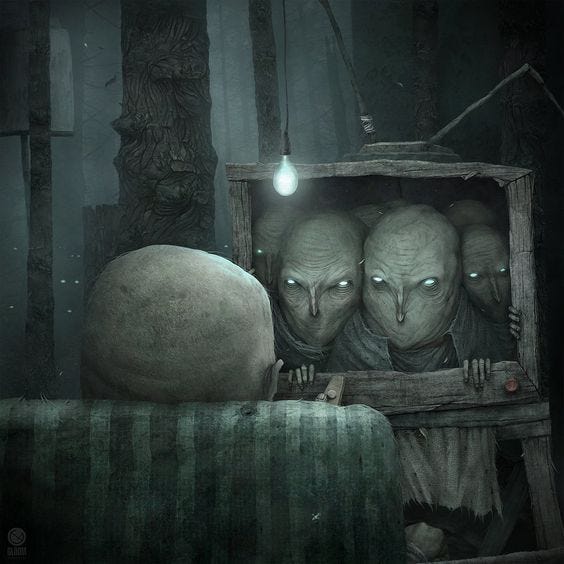
(6) WHICH BOOK ARE YOU TOO SCARED TO READ?
I cannot rightly say that there exists a book that I’m too scared to read. I’ve been quite transparent with my lack of luck when it comes to collecting books from the lists boasting the scariest stories of all time, or the greatest Horror to ever exist. Yet, I tend to go back for more because, in all honesty, I simply & deeply love to read.
When I first heard of Peter Straub’s “Ghost Story” (1979), Arthur Machen’s “The Great God Pan” (1894), & David H. Keller’s “The Thing in the Cellar” (1940), I had been expecting to find a tale both dastardly & malevolent. My search for the scariest story—which will spook my socks off—is ongoing.
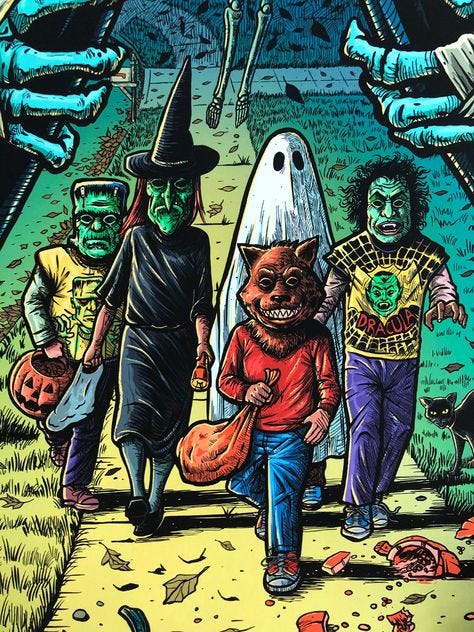
(7) WHAT IS THE SPOOKEST CREATURE IN A BOOK?
At the risk of sounding corny, I think the answer to this question is entirely dependent on the story itself. I am not much of a reader of fantastical Horror. Some modern pieces that I have read have included mystical or biblical creatures, made cruel in their neutral pursuits—think John Langan’s “The Fisherman” (2018). However, I have rarely found myself seeking out the traditional monsters that shadow classic stories of the genre. I suppose I might use this as my sign to do so.
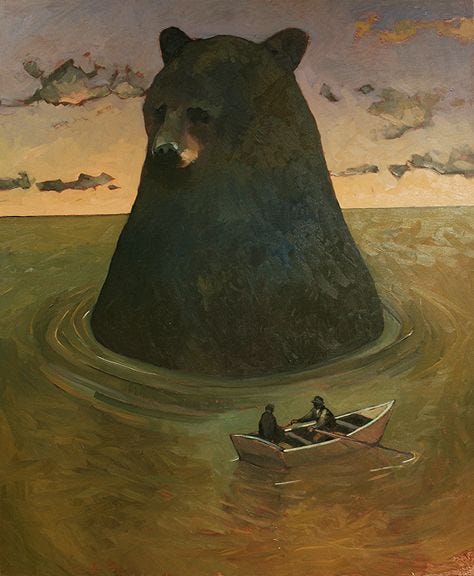
(8) WHICH CLASSIC BOOK HAUNTS YOU TO THIS DAY?
Rather than lean on the traditional insinuation of the word—there have been many stories that haunt my mind in that, their plot or the author’s genuinely magnificent writing, has remained as much a part of my person as the skin I live in. Without fault, Ray Bradbury’s writing & quick wit are a promise to me of the beauty that exists in stunning minds. Particular favourites of mine are “The October Game” (1947) & “Something Wicked This Way Comes” (1962).
The works of Jean Paul Sartre, « La nausée » (1938), André Gide, « L’Immoraliste » (1902), Gaston Leroux, « Le Fantôm de l’opéra » (1909); Mary Wollstonecraft Shelley’s “Frankeinstein, or The Modern Promethius” (1818), Oscar Wilde’s “The Picture of Dorian Gray” (1890), & Mikhail Bulgakov’s “The Master and Margarita” (1967), among others plague my mind like Meningitis.
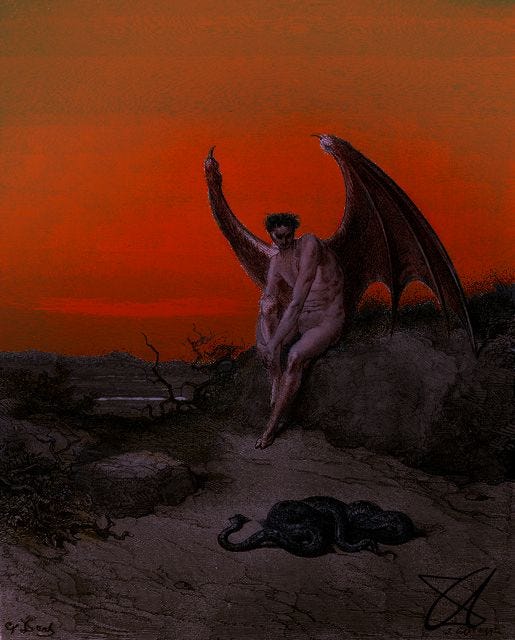
(9) WHAT IS YOUR FAVOURITE CLIFFHANGER OR UNEXPECTED TWIST?
It’s rather difficult to top the feeling I had when reaching the final pages of Agatha Christie’s “And Then There Were None” (1939). I will attribute my great joy while reading this book to my own bias. I had read very few of Christie’s books at that point & was eager to make my way through another—finding myself all the more interested in the mind of the author who conjured such marvellous oddities. As I said, I have a particular bias, scary stories (movies & the like) that include phrogging—i.e. someone living inside of the walls unbeknownst to another person—are a particular favourite of mine.
There I was, ready to claim my win, believing myself to have outwitted the Master. Lucky for me, she went another way & I was both marvellously cheery at having been wrong & robustly intrigued at how she organized it all. The murder-suicide plot never crossed my mind, which is odd given it is highly popularized in modern society as the go-to escape route, one often sees in media & reality alike.
I was so pleased to have been wrong. I find myself still looking back at this book fondly. I am saving my re-read for a special rainy day wherein I might return on the path to the seaside estate & test my luck again; noting all the clues with diligence & gusto.
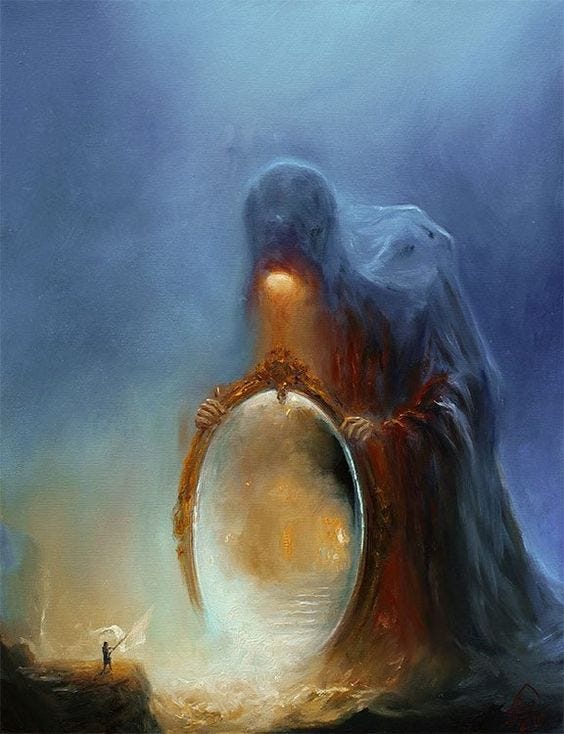
(10) WHICH CLASSIC BOOK DID YOU REALLY, REALLY DISLIKE?
I have been an avid reader for many, many moons, I have come upon more than my fair share of absolutely delicious reads & a sprinkling of others; the second group of which I have very much less than fond feelings towards. It’s difficult to recall the ones that left me feeling so tirelessly annoyed as to dislike them however, I will leave a special mention of Anne Brontë’s “The Tenant of Wildfell Hall” (1848) which is a story inside of another story, which tells of another story, written about another story, all within a story. Ultimately, it was a rather tiresome drag & I found myself utterly disinterested in the rambling journal entries that went on without end about the very same situation, over & over, & over again.
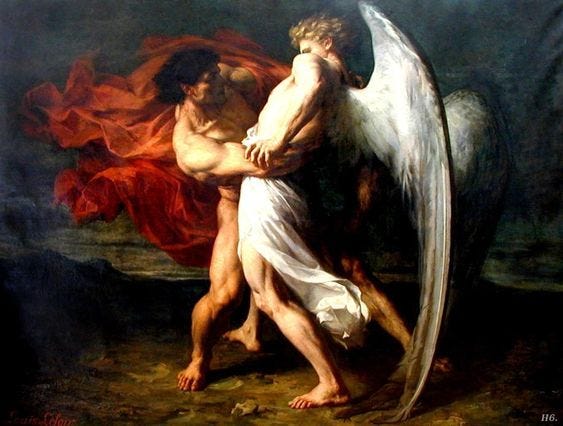
(11) WHICH CHARACTER DEATH DISTURBED/UPSET YOU THE MOST?
Alas, there have been none—as of yet. With that being said, I do not tend to read graphic, gore-centric, Horror—I find it rather tedious & redundant. Perhaps, had I read more I might have a proper answer for you now.
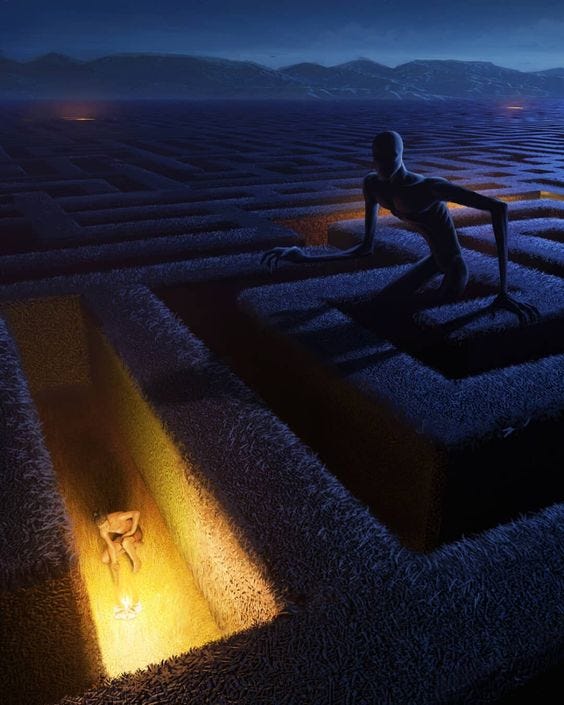
(12) LIST YOUR TOP 5 GOTHIC/SCARY/HORROR CLASSIC READS.
Rather than rehash what I have already listed, I leave it to you—select via the few & many, the titles that appeal to you. You will see the redundant nature of my love for certain authors in this tag & in my reading tendencies at writ large.
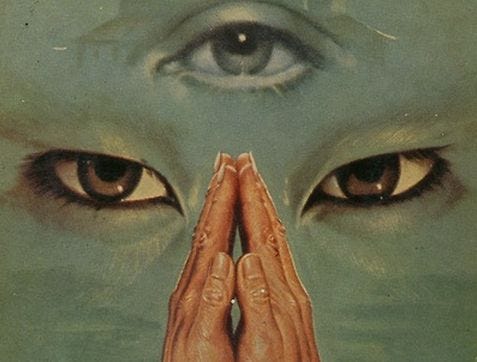
(13) SHARE YOUR SCARIEST/CREEPIEST QUOTE, POEM, OR MEME.
“Where there is no imagination, there is no horror.”
― Arthur Conan Doyle, “A Study in Scarlet” (1887)
-
“Somewhere in him, a shadow turned mournfully over. You had to run with a night like this so the sadness could not hurt”
― Ray Bradbury, “Something Wicked This Way Comes” (1962)
-
“The stream of life is black and angry; how so many of us get across without drowning, I often wonder. The best way is not to look too far before-just from one stepping-stone to another; and though you may wet your feet, He won't let you drown-He has not allowed me.”
― Joseph Sheridan Le Fanu, “Uncle Silas” (1864)
-
“We have so much to say, and we shall never say it.”
― Erich Maria Remarque, “All Quiet on the Western Front” (1928)
Until next time,
C. x

